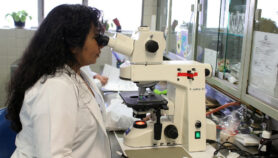27/10/18
Philippines launches blockchain research lab

By: Melanie Sison
Send to a friend
The details you provide on this page will not be used to send unsolicited email, and will not be sold to a 3rd party. See privacy policy.
[MANILA] AMBERLab, the Philippines’ first university-based blockchain research laboratory, is expected to raise awareness in this country of the new technology that registers and distributes information securely but without a central administrative setup.
The Philippine initiative, launched 22 October by the Ateneo de Manila University and health-tech startup mediXserve, is an advanced research centre and think-tank. It is intended to generate programmes and studies to solve problems in such sectors as health, education, transportation, agriculture, disaster response, governance, and legal affairs.
“Blockchain represents nothing less than the second era of the internet… We need to have a scientific approach towards developing uses of blockchain”
Jojy Azurin, mediXserve
"We want to be a cradle for research and development. We want to develop students who can come up with solutions to solve the needs of society," says Maria Regina Estuar, AMBERLab director. "Most of the current services do not reach the underserved. And if it does, the cost is too high for an ordinary Filipino to receive its full benefits. To transform ICT solutions into blockchain technology, we eliminate layers of transactions, which means lower cost of service delivery."
Blockchain, developed by an individual or a group that took on the pseudonym Satoshi Nakamoto in 2008, is a technological innovation for the storage and sharing of digital information. Data is stored across a network, unlike the conventional system wherein information is stored in a single database. This makes it make difficult for hackers to get access to the information stored there. Blockchains are also designed in such a way that it makes it practically impossible to revise previously stored data. Attempts to do so can invalidate the entire database.
While the blockchain technology is commonly associated with cryptocurrency, specifically Bitcoin, it has since evolved for use in different sectors. According to a recent study, 42 per cent of the world's top 50 universities now offer at least one course on blockchain in their curricula.
Emerson Fonseca, head of NEM Philippines, a partner of AMBERLab that helped build the curriculum, points out that current students need to familiarise themselves with the blockchain technology to keep up with the demands in the global setting. "We believe that the younger generation has to be prepared for every innovation, for every new technology.”
Azurin’s strategy is to form a community of supporters of blockchain. "The individual startups industry cannot do R&D alone. It takes a village, a community of businesses, academe, government agencies, and civil society organisations to use blockchain as a springboard for our country's development."
This piece was produced by SciDev.Net’s Asia & Pacific desk.













